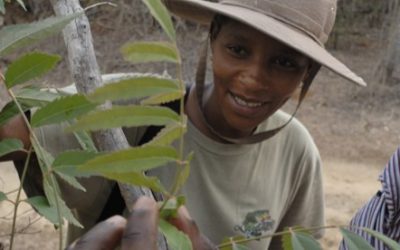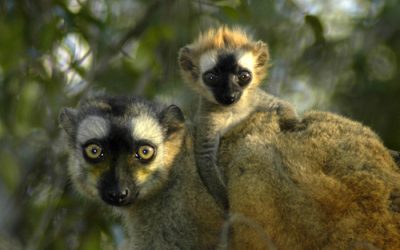Who’s going to ensure that the haunting gaze of the critically endangered blue-eyed black lemur looks down on future generations? In response to this, and other pressing conservation concerns in Madagascar and Indian Ocean islands, a pioneering TBA master class has strengthened the hand of local organisations which can play a crucial role in the successful outcomes of conservation projects in the region.
In the biodiversity hotspot known as MADIO (Madagascar and Indian Ocean islands), programmes managed by non-government organisations (NGO) can be vital in ensuring the survival of the iconic species in the region: many are initiated by motivated local people who have a deep understanding of cultural and social issues that will affect long-term success; they are often well-placed to liaise and work with communities and other local stakeholders in conservation programmes.
However, essential skills training for the people managing these NGOs is severely lacking, a gap that the TBA master class is designed to address. The first of two training programmes, funded by the Critical Ecosystem Partnership Fund (CEPF), was delivered in April in Madagascar and a second master class is planned for later in the year.
“Building on TBA’s successful integrated training in East Africa, we have created a new training programme, specifically designed for NGOs and it is being pioneered in Madagascar and the Indian Ocean Islands,” said Dr Rosie Trevelyan, TBA Director.
The TBA approach to capacity building is to teach skills which are practical, relevant and transferable. The MADIO master class brought together 14 highly motivated participants selected from NGOs in Madagascar, Mauritius, Comoros Islands and the Seychelles. Working in diverse fields – including marine conservation, fisheries, lemurs, insects and youth education – the combined experience of participants made a rich learning environment. Over five days, the master class included tutorials, practical sessions, group discussions, case studies, and a site visit to a successful community project linking conservation and livelihoods in a threatened wetland area.
The participants learnt approaches to project design such as the theory of change, and how to measure the impact of their work and communicate their conservation success stories to different audiences. They also learnt fundraising skills and how to navigate the terminology that different funders use.
“Everybody on the course said that they hadn’t come across this kind of training before, and yet these are key skills that NGO managers need in order to run conservation projects, successfully and sustainably, on the ground,” said Dr Trevelyan, adding:
“This was the right thing to teach to the right people at the right time.
“Clearly there is a huge need, and TBA could make a real impact by running these courses in Africa more widely.”
Those who attended the TBA master class now feel empowered. Vatosoa Rakotondrazafy, is better equipped to make a difference in her work for the MIHARI Network: “I’m now clearer about what all the components of a project are now. Rosie explained the lessons very clearly and made it very interesting to learn,” she said.
Ali Attoumani, of the Mlezi NGO in the Comoros Islands, said:
“One of the best things I learnt was how to communicate the impact and results of my conservation work. I am definitely going to apply this when I get back.”
As for Ramanankirahina Rindrahatsarana, who is working for the Malagasy NGO, Mikajy Natiora Association, to protect the Blue-eyed Black Lemur, she was impatient to apply her new skills: “The session on how to design indicators was very interesting and I am going to share my knowledge about the different kinds of indicators that there are with the rest of the people at my NGO.
Participants brought details of their own projects to work on, increasing the impact of learning and ensuring that new knowledge and skills are applied immediately to the specific challenges they face. Another ‘plus’ is that all the participants shared their own experiences and gained useful feedback from each other, which helped them to improve their own work.
Collaboration is a hallmark of TBA training and teaching, and leading figures from two Malagasy conservation NGOs gave talks to share their own experiences. TBA alumna, Julie Hanta Razafimanahaka, who became the first Malagasy Director of Madagasikara Voakajy, described how the organisation had grown from small beginnings to be one of the country’s most well-known conservation organisations.
At the end of the master class, two Malagasy participants, benefitted from additional one-to-one mentoring support, adding to the value of this capacity building package. In spite of the differences in their individual projects, all the participants were delighted to meet others working for conservation NGOs in their region. They have now formed a new network, determined to stay in touch and support each other as they return to the daily challenge of practical conservation, for the long term.
(Title image: Charlie Marshall)






